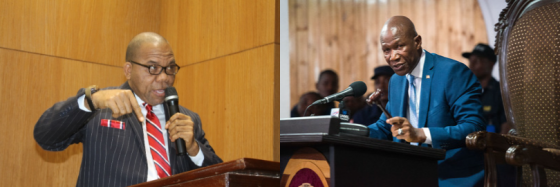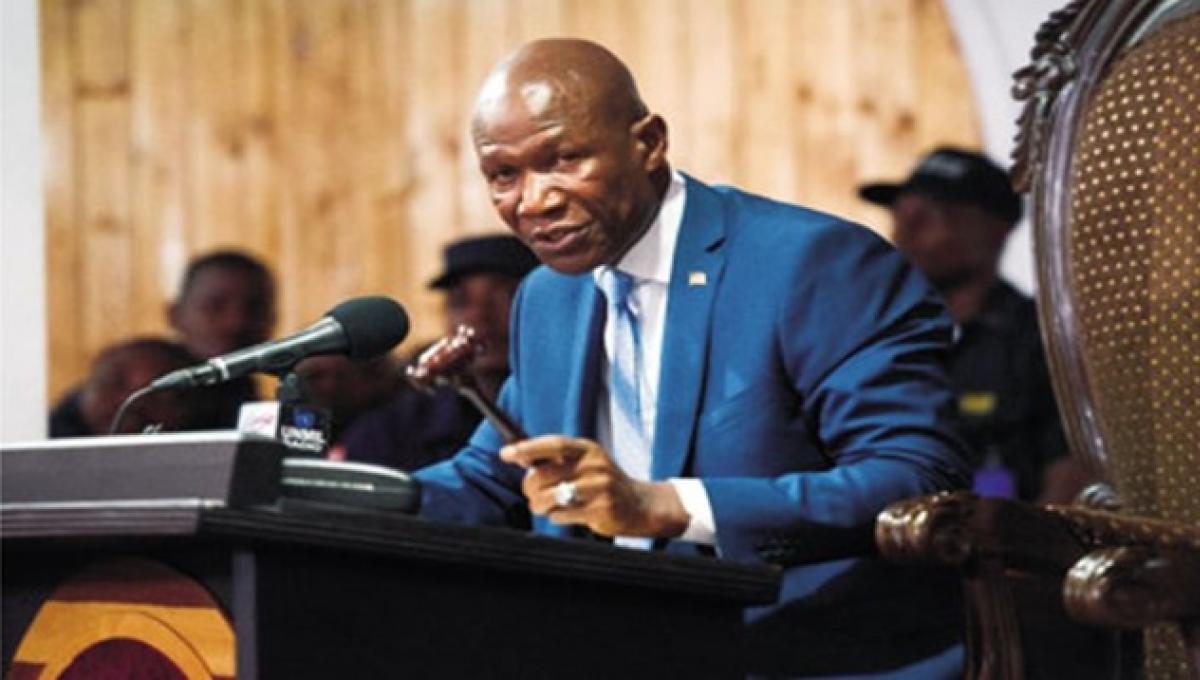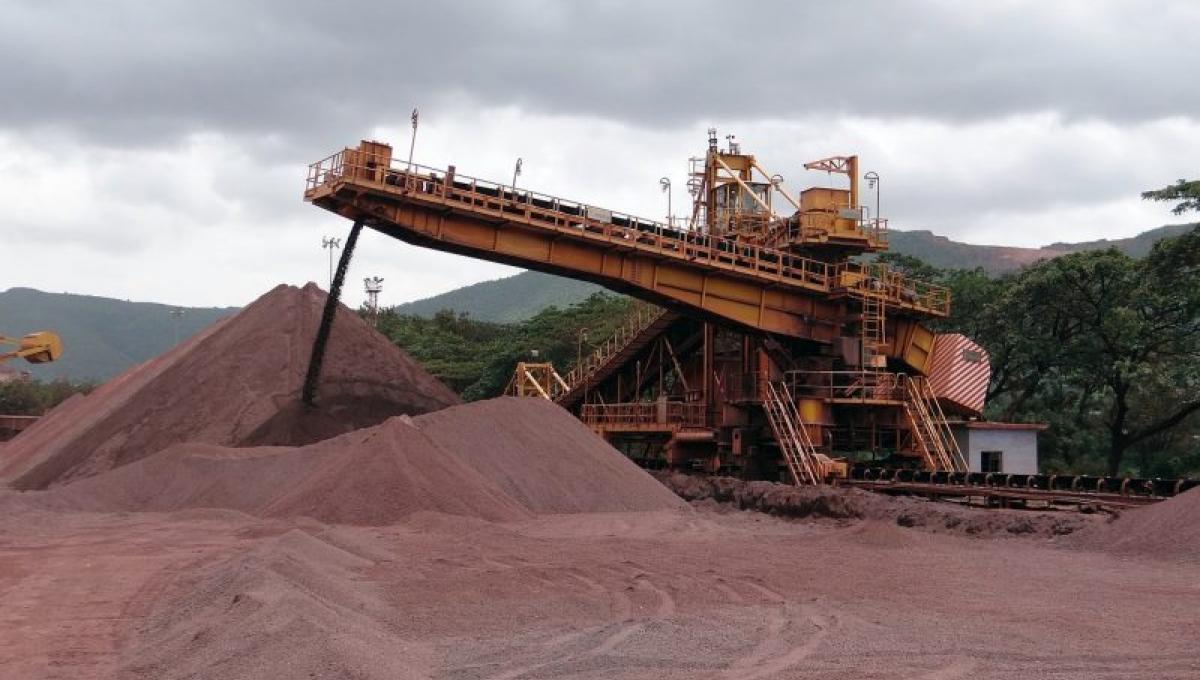Liberia: Senate, House in Tug-of-War over Bao Chico MDA

(L-r) Senate Pro-Tempore Albert Chie and
Speaker Bhofal Chambers of the House of Representatives.
-- Supreme Court may have to decide (or not) on who has first right of review
The Senate plenary has voted unanimously to sue the House of Representatives for the “wrongful” interpretation of Article 34d(i), of the Liberian Constitution of 1986.
The Senate’s decision was prompted by a communication from the House of Representatives that the process leading to ratification of the BAO CHICO Mineral Development Agreement violated Article 34d(i) of Liberia’s 1986 Constitution.
Article 34d(i) of the 1986 Constitution states that “all revenue bills, whether subsidies, charges, imports, and other financial bills, shall originate in the House of Representatives; but the Senate may propose or concur with amendments as on other bills.”
Debating the House’s letter, the Senate unanimously complained that the action is demeaning and borders on their integrity and should seek “the necessary interpretation by and through the Supreme Court of Liberia should be sought to put this matter to rest.”
The House of Representatives argued that a closer review of the document reveals that the rejection triggered the origination clause such as goods and services tax, surtax, real property taxes, import, excise duty tax and ECOWAS trade levy, among others. The House then declined to concur with the Senate’s ratified version of the MDA on the ground that Article 34d of the 1986 Constitution clearly states that all revenue bills… shall originate in the House of Representatives.
“Under 16.6 mineral development fund is also further clarified that the primary motivation of the government of Liberia in entering into these agreements is to raise revenue for general government operations; hence the Act to ratify the mineral development agreement between the government of the Republic of Liberia and BAO CHICO Resources Liberia Ltd, should originate from the House of Representatives before the Senate can concur with amendments if any,” the House said.
“Given the foregoing, the honorable House will like to inform you to please Constitutionally have the action reconsidered in said proposed legislation, Senate engrossed Bill five (5); because, it seeks to generate revenue for the people and government of Liberia through taxes imposition and other financial purposes; and that the honorable Senate hereafter gives such Constitutional consideration on subsequent bills that may come in the future in this category.”
According to a Liberian expert on constitutional law, who asked not to be named, the issue boils down to two issues. First, it depends on how the Legislature defines the terms ‘revenue bills’ and ‘other financial bills’. Second, the Supreme court may or may not agree to deliberate on the matter, depending on the political weight it carries.
“However, if the Court decides to take it on constitutional grounds, then the Court will have to give a statement of clarification of Article 34d(i). The Court will ask, ‘do concession agreements constitute revenue bills [or] other financial bills?’ So the other question will be, what is a revenue bill or a financial bill? If the Court must decide, it will [most likely] decide in favor of the Lower House," the legal expert explained. " But I doubt that the Court will want to deal with the matter in the first place. The Court could also likely say, ‘this is a political question. This question has nothing to do with whether or not someone is violating the law; it has something to do with [legislative procedure]. So, go back and solve it among yourselves.”
“It’s catchy but, for me, if I had the ears of the court, I would say you cannot call this a political question, you should rather define those two terms -- ‘revenue bills’ and ‘other financial bills’. Are concession agreements revenue bills, or are they other financial bills? When the Court answers those two questions, the Court can decide,” the lawyer explained.
The explanation by this legal expert suggests that the Senate might be trying to use the Supreme Court to establish precedence with regards to how mineral development agreements should progress through the Legislature. It is well noted that the Bao Chico MDA has not gone through one ounce of public scrutiny in the Senate, which is now seeking the concurrence of the House of Representatives on the MDA.
If the Senate is allowed to have its way in this instance, there are concerns that the ArcelorMittal revised MDA, which has yet to be made public in spite of numerous calls for transparency and public scrutiny, might follow a similar trend.
BAO CHICO Resources Limited
The BAO CHICO agreement is for the extraction of iron ore, to be operated under a Class A mining license for an initial term of twenty-five (25) years in Gbarpolu County within the area specified on the license which covered a total area of 87.4km2 within Gbarpolu County.
The company’s investment is in the tune of US$500 million, aimed at improving the country’s economy, creating job opportunities and scholarships for citizens as part of its support to the Government’s Pro-Poor Agenda for Prosperity and Development (PAPD).
However, the government is yet to state the total number of jobs the concession is expected to create.
The BAO CHICO deal, according to the government, is expected to bring in an annual social contribution of US$300,000 and, after five years, escalate to US$500,000 until the end of the term. Also, an additional US$10,000 is expected for Gbarpolu County as General Education Funding, while US$50,000 will be provided annually as Scientific Reserves Fund.
However, the deal’s clauses remain in secret and come three years after the Weah administration announced a swap deal with China that will see Liberia exchange its natural resources for US$2.5 billion as financing for the country’s development.
At a press conference at the time, Finance Minister Samuel Tweah disclosed that the agreement with China was an “Investment facility – a sort of monetization that would leverage the country’s natural resources for hard currency – and that resources extraction would commence after conducting a feasibility study to determine the exact value.
“Let me be very clear on it, this is not a loan. It is an investment facility; a framework entered into between the China Road and Bridge Corporation and the Government of Liberia under the FOCAC arrangement to unveil US$2.5 billion for financing the country’s development over the next five years,” Min. Tweah disclosed after he had returned from China along with President Weah and others attending the Forum on China Africa Cooperation (FOCAC) in 2018.
The ratified MDA comes just a few years after the US$2.6 billion agreement, which was signed with the China Union in 2009 under the administration of then-President Ellen Johnson Sirleaf to excavate iron ore from the country’s former Bong Mines, did not go as planned, as the company remains shut down since 2014.
Since then the iron ore concession – the area where the ore mining was done – only boasts of idle machines gathering rust. The company, according to its management, had to close due to the fall in the global price of iron ore and the impacts of Ebola in 2014.
The 25-year China Union agreement was expected to generate 3,000 to 4,000 jobs with an additional 15,000 indirectly, which hardly came to fruition. During the administration of President Ellen Johnson Sirleaf, for example, 64 out of 66 concession agreements passed into law were declared bogus by the Moore-Stephens audit report.
Alluding to this, the Senate while debating the Bao Chico MDA, recalled that previous agreements ratified by the Legislature had yielded little or no fruits, leading to citizens’ pressure and accusation that they do not exercise their oversight responsibilities. The Senators’ concerns come as they have the power to amend the deal, approve or reject it, which they believe, like any other concession deal, is loaded with unfavorable clauses for the country. But it is unclear if they did so.
However, the Senators, despite raising these concerns, in light of the agreement being kept secret from the public, still went ahead and affixed the signatures for passage, which has now been rejected by the House of Representatives.
Meanwhile, Gbarpolu County is known more for diamond and gold deposits than for iron ore.
But Bao Chico insists that it will be mining iron ore in Gbarpolu County. The company has received an endorsement from China Union Investment (Liberia), through a letter addressed to Mines and Energy Minister Gesler Murray, acknowledging ‘ongoing discussions between the two Chinese mining companies concerning the use of existing Liberian rail and port infrastructure within the China Union’s concession area.
The letter concludes with the disclosure that “Bao Chico and China Union both share similar shareholders: Baosteel Resources (International) Co., Ltd, and China-Africa Development fund, respectively.”
There are questions to be answered concerning how Bao Chico plans to share the rail infrastructure used by China Union, for example. According to the Republic of Liberia Planning and Development Atlas (1983), there is no rail infrastructure in Gbarpolu County. Thus, Bao Chico would need to build a rail extension from the China Union concession area in Bong Mines, connecting northwest to its mine in Gbarpolu, to convey iron ore to Monrovia.
In the absence of China Union activity currently on the existing rail line, there is still a lot of ongoing commercial activity along the railroad. Local traders use the makeshift push carts fitted on the train track to transport agricultural produce to market hubs along the railroad between Bong Mines and Duala.
Such use of the railroad by non-concessionaire actors has become a key economic input for communities that are too rural to affordably transport goods by other means. Their use of the railroad keeps prices low and speeds up access to markets.
Editor note: This story has been updated to include the expert view.


